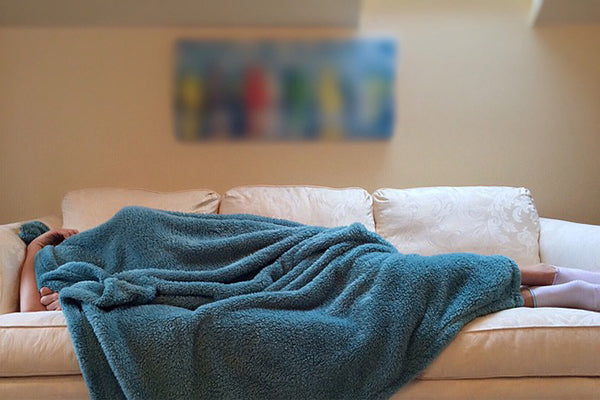Benefits, advice and risks of melatonin
Write the 27/03/2023 by Santarome Bio
Melatonin is a hormone that plays an important role, it is involved in the regulation of our internal clock . It is mainly known for its role in regulating sleep, helping to trigger drowsiness.
Melatonin production increases at the end of the day, which helps us fall asleep more easily. It is produced naturally in response to decreasing light, signaling to our bodies that it is time to relax and sleep.
Melatonin also plays other important roles in the body, including as a powerful antioxidant, supporting the immune system, regulating metabolism, and protecting the nervous system.
The benefits of melatonin
If you suffer from sleep disorders , you are not alone. Millions of people around the world have trouble falling or staying asleep, which can harm their health and well-being. This is where melatonin can come in to help improve sleep quality.
Melatonin supplements have gained popularity in recent years to help people with sleep disorders return to a healthy, restorative sleep cycle.
Here are some of the benefits of melatonin :
- Promotes falling asleep : Melatonin can help reduce the time it takes to fall asleep, which can be especially beneficial for those who have difficulty falling asleep quickly.
- Improves sleep quality : Melatonin may help improve sleep quality by promoting deep, restful sleep. This may help reduce nighttime awakenings and improve recovery during sleep.
- Reduces the effects of jet lag : Melatonin can help alleviate the effects of jet lag, helping the body adapt more quickly to a new time zone.
- Antioxidant effect : Melatonin is also a powerful antioxidant that can help protect cells from damage caused by chemicals in the body.
Using melatonin supplements can help improve quality of life and overall well-being.

Tips for taking melatonin
Melatonin is a naturally produced hormone; it can also be taken in the form of food supplements to help regulate sleep and treat certain disorders. However, it is important to follow proper advice when taking to ensure optimal use.
Dosage
The recommended dosage of melatonin may vary depending on individual needs. It is important to start with a low dose and gradually increase until the correct dosage is reached.
Please note that higher doses do not necessarily mean better results. Doses that are too high can cause daytime sleepiness and unwanted side effects.
Time of taking
It is recommended to take melatonin approximately 30 minutes before bedtime. It's also important to take it at a regular time each evening to help regulate your circadian rhythm.
Duration of intake
The duration of taking melatonin may vary depending on your needs. However, it is recommended not to take it for an extended period of time. It is best to take regular breaks to avoid a buildup of the hormone in your system.
Other important tips
It is necessary to speak to your doctor before starting to take melatonin especially if:
You are pregnant,
You are breastfeeding,
-
You are taking medication
You have health problems.
We advise using melatonin in combination with good sleep hygiene, including a quiet, comfortable environment for sleeping, a regular bedtime routine, and adequate time to sleep. Also avoid stimulating activities before bed, such as bright screens and strenuous exercise.
To improve the quality of sleep, Santarome offers two types of food supplements: Somnifor 4 Actions and Melatonin Sleep ampoules.
Somnifor 4 Actions melatonin tablets are convenient to take and contain melatonin to help significantly improve sleep quality.
Food supplements based on melatonin from Santarome are an added value for the quality of sleep and can help deal with sleep disorders in a natural and effective way.
The potential risks of melatonin
Melatonin is produced naturally by the pineal gland in the brain; it can also be taken in the form of food supplements to help regulate sleep and treat certain disorders. However, as with any medication, there are potential risks associated with taking melatonin.
Side effects
Certain side effects may occur in some people, including:
Headaches,
Daytime sleepiness,
Dizziness,
From anxiety,
From irritability,
Nightmares,
Nausea.
These side effects are usually temporary and disappear once melatonin use is stopped or the dose is reduced.
Use in children and pregnant women
Concerning the use of melatonin during pregnancy or breastfeeding, the available data do not allow conclusions to be drawn on its effects on the fetus or infant. For this reason, it is recommended not to take melatonin unless recommended by a doctor.
In addition, melatonin is contraindicated in certain people such as:
People suffering from inflammatory or autoimmune diseases,
Children and adolescents,
People who must carry out an activity requiring sustained vigilance,
People with epilepsy,
People with asthma,
People suffering from mood, behavioral or personality disorders,
People undergoing drug treatment.
Taken in the form of a food supplement, melatonin can help regulate sleep and treat sleep disorders. It helps improve the quality of sleep and reduce symptoms associated with jet lag.
For safe and effective use of melatonin, it is important to talk to your doctor before starting to take it, especially if you are taking other medications.
In summary, melatonin can be a useful tool for regulating sleep and treating certain disorders, but it is important to be aware of the potential risks and follow recommendations for safe and effective use.


















